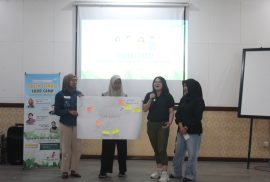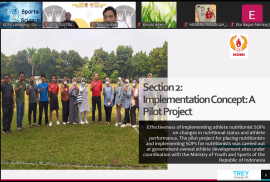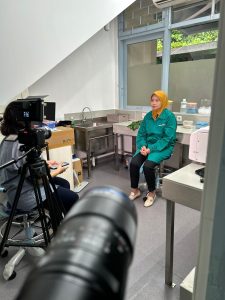Yogyakarta – Departemen Gizi Kesehatan, Fakultas Kedokteran, Kesehatan Masyarakat, dan Keperawatan (FK-KMK) UGM kembali melaksanakan kegiatan pengabdian kepada masyarakat untuk pekerja di sektor penyelenggaraan makanan. Kali ini, kegiatan difokuskan pada peningkatan kesadaran serta kapasitas petugas katering dalam menerapkan prinsip gizi seimbang dan postur kerja ergonomis untuk mencegah gangguan muskuloskeletal akibat pekerjaan (Work-Related Musculoskeletal Disorders/WRMSD).
Work-Related Musculoskeletal Disorders/WRMSD merupakan salah satu penyebab disabilitas terbanyak kedua di dunia. Kondisi ini ditandai dengan nyeri otot, tulang, dan persendian yang dapat mengganggu produktivitas kerja hingga meningkatkan beban ekonomi individu maupun institusi. Studi-studi global menunjukkan tingginya prevalensi WRMSD pada pekerja industri katering dan restoran, termasuk di negara-negara Asia seperti China, Malaysia, dan Hong Kong. Meskipun dipengaruhi oleh usia dan kondisi kesehatan, WRMSD dapat dicegah melalui faktor yang dapat dimodifikasi, seperti penerapan ergonomi kerja yang tepat dan asupan gizi yang menunjang kesehatan muskuloskeletal.








 Cassava is a root vegetable with several benefits, from the root to the leaves. The most frequent part of being consumed is the root, which is mainly consumed as steamed, boiled or fried cassava. The leaves are commonly found in Indonesian cuisine as side dishes served with rice and rendang meat or cooked with coconut milk as “gulai”. In some parts of rural districts in Indonesia, cassava has been processed as a rice substitute for a long decade since the rice is commonly pricey for the villagers or cannot be cultivated as frequently as cassava. In general, rice can be harvested twice a year, sometimes three times at the most, while cassava is possibly more than that. The other benefit of cassava is that it has a lower glycemic index but is rich in carbohydrates, which is potentially better than rice for people with diabetes. Cassava roots are also a good source of vitamin C, which is good for immunity, and resistant starch, which is good for the gut, improving blood sugar management and increasing feeling of fullness, which is good for people with obesity to control their appetite and body weight. Not only the health benefits, but cassava consumption also needs to be encouraged as the staple food substitute to increase diversification. Since the rice dependency in Indonesia is growing while the rice production may not be sufficient for the entire population, alternative food needs to be introduced, and cassava can play the role of a main character.
Cassava is a root vegetable with several benefits, from the root to the leaves. The most frequent part of being consumed is the root, which is mainly consumed as steamed, boiled or fried cassava. The leaves are commonly found in Indonesian cuisine as side dishes served with rice and rendang meat or cooked with coconut milk as “gulai”. In some parts of rural districts in Indonesia, cassava has been processed as a rice substitute for a long decade since the rice is commonly pricey for the villagers or cannot be cultivated as frequently as cassava. In general, rice can be harvested twice a year, sometimes three times at the most, while cassava is possibly more than that. The other benefit of cassava is that it has a lower glycemic index but is rich in carbohydrates, which is potentially better than rice for people with diabetes. Cassava roots are also a good source of vitamin C, which is good for immunity, and resistant starch, which is good for the gut, improving blood sugar management and increasing feeling of fullness, which is good for people with obesity to control their appetite and body weight. Not only the health benefits, but cassava consumption also needs to be encouraged as the staple food substitute to increase diversification. Since the rice dependency in Indonesia is growing while the rice production may not be sufficient for the entire population, alternative food needs to be introduced, and cassava can play the role of a main character.